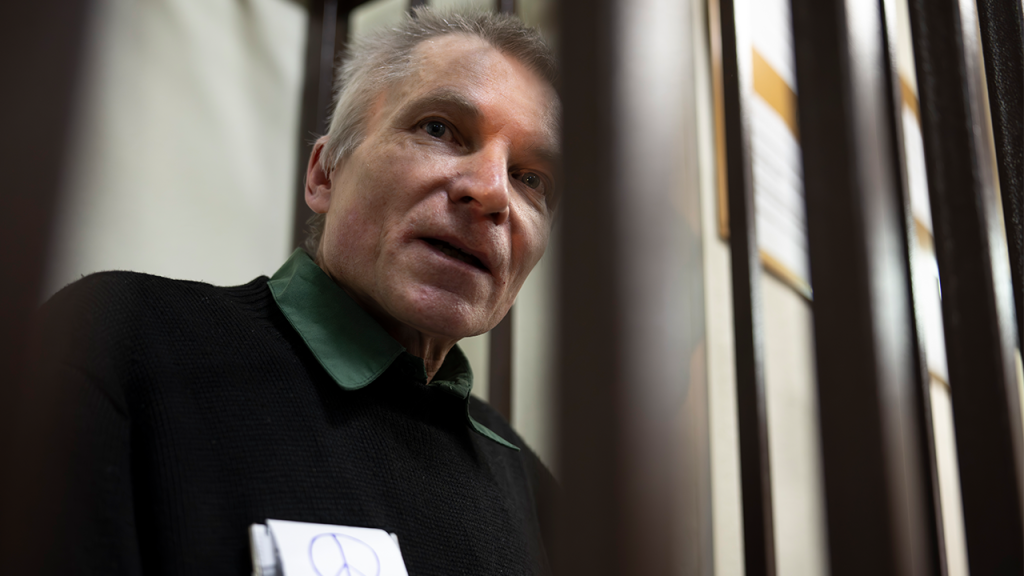Alexei Gorinov, a notable Kremlin critic, faced a renewed conviction on Friday, receiving a three-year prison sentence for his vocal opposition to Russia’s war in Ukraine. This trial, extending over three days, underscored the Kremlin’s assertive intolerance towards dissent and the broader crackdown on those who voice opposition to the government’s military actions. Gorinov, at 63 years old, is a former member of a municipal council in Moscow and is currently serving a seven-year term for publicly criticizing the invasion of Ukraine, as reported by The Associated Press. The court in the Vladimir region imposed this latest sentence, which effectively extends his prison time to a total of five years in a maximum-security facility, as stated by his lawyer through the independent news site Mediazona.
Gorinov’s initial conviction occurred in July 2022 when he was sentenced to seven years in prison for “spreading false information” about the Russian military during a municipal council meeting. His comments included skepticism regarding a children’s art competition and poignant remarks highlighting the loss of life among children in Ukraine amidst the ongoing conflict. Notably, Gorinov became the first individual to be imprisoned under a 2022 law that stifles any public dissent against the government’s narrative about the war. His case represents a significant case study of the increasing risks faced by ordinary citizens in expressing anti-war sentiments, showcasing the chilling effect of governmental repression on democratic expression.
In a statement made from prison in March 2023, Gorinov reflected on the purpose of his imprisonment, suggesting that authorities sought to create an example out of him — a representative of the general populace rather than prominent public figures. His conviction highlighted a broader trend of the Kremlin targeting dissenters, employing harsh legal consequences to silence those who challenge the state’s version of events regarding the war in Ukraine. Following this, in 2023, a new case against Gorinov was initiated, accusing him of “justifying terrorism” for remarks made to fellow inmates concerning the Ukrainian Azov battalion and the Crimean bridge explosion. Gorinov firmly denied these charges, arguing that his comments merely affirmed the status of Crimea as Ukrainian territory and described Azov as part of the Ukrainian military.
The trial that commenced in the Vladimir region revealed Gorinov sitting in a defendant’s cage, a stark representation of his standing within the judicial system and the impact of state oppression on free speech. He displayed a hand-drawn peace symbol on his prison badge, alongside a placard advocating for an end to the war, further underscoring his commitment to peace amidst personal adversity. In his closing statement, he expressed a profound sense of moral responsibility, declaring that his inability to prevent the war was his collective guilt. He called for shared accountability among those who orchestrate and support the conflict while extending a plea for forgiveness to the victims of the war, both in Ukraine and among fellow Russian citizens.
The toll of this oppression is stark, with reports indicating that since the onset of the conflict in February 2022, approximately 1,100 individuals have faced criminal charges linked to their anti-war positions. Human rights organization OVD-Info highlights that nearly 350 of these dissenters currently find themselves imprisoned or forcibly placed in medical institutions. The scale of this repression paints a troubling picture of a society in which speaking out against the government’s military actions can result in severe legal consequences, indicative of a move towards greater authoritarianism in Russia.
Gorinov’s case serves as a critical reminder of the high stakes involved in political dissent within contemporary Russia. His repeated convictions and extended sentences exemplify the lengths to which the state will go to maintain its narrative and suppress opposition. His imprisonment and the broader crackdown on dissent signal a significant erosion of civil liberties and an environment where the expression of dissenting views can incur dire consequences, cultivating a climate of fear and silencing potential voices of change. The ongoing situation emphasizes the need for international attention as the patterns of suppression unfold, revealing the grim realities of political expression in a nation at war.

